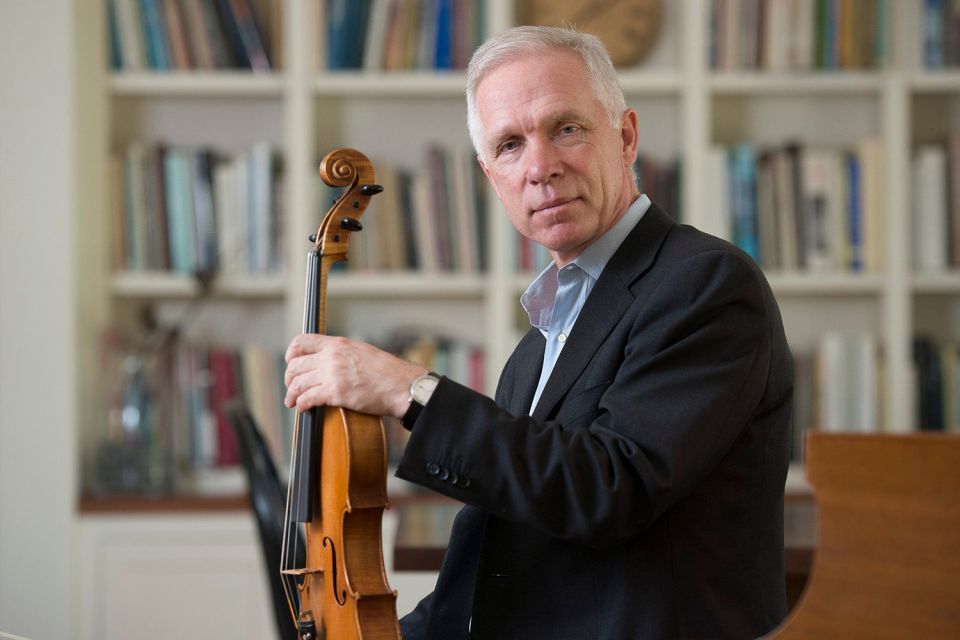Composer Ludwig van Beethoven’s history, reception and evolution as an artist is the subject of a new Stanford Online course that is free and open to the public.

Music historian Stephen Hinton is leading a new online course exploring Beethoven’s music and development as a composer. (Image credit: L.A. Cicero)
The course, which launched in spring quarter, is designed for any level of musical literacy – from beginner to buff – with the aim of enhancing people’s understanding and appreciation of Beethoven’s music through the study of his string quartets, a genre of music involving two violins, a viola and a cello.
“Beethoven made a mark with his string quartets,” said Stephen Hinton, Avalon Foundation Professor in the Humanities and professor of music history at the School of Humanities and Sciences. “His last five string quartets are widely considered to be the pinnacle of Western art music, although at the time many people considered them to be the ravings of a mad man who had gone deaf.”
Defining the String Quartet II: Beethoven, which is now open for enrollment for anyone curious about the composer, is a sequel to Stanford’s first free online course on classical music appreciation, called Defining the String Quartet: Haydn, that launched in 2016 and focused on the origins of the string quartet and its celebrated “father,” Joseph Haydn, who was also Beethoven’s teacher.
As part of the new class, Hinton analyzes in depth three of Beethoven’s string quartets, one from each of the three periods of the musician’s career, called early, middle and late. The three pieces are Opus 18 No. 4, Opus 59 No. 3 and Opus 131. The latter piece, which Beethoven wrote toward the end of his life, was reportedly the composer’s favorite string quartet, Hinton said.
“Not only have Beethoven’s 16 string quartets long enjoyed a reputation as one of the crowning achievements in the history of Western classical music,” Hinton said, “they are also like a diary of his development as a composer. By comparing them, you can see how he evolved as a musician.”
The seven-week course, which began April 16, features recorded live performances of Beethoven’s work by the renowned St. Lawrence String Quartet at the Bing Concert Hall as well as Hinton’s commentaries on the music.
Hinton co-developed the new class with the members of the St. Lawrence String Quartet, the university’s ensemble-in-residence. They worked in collaboration with the Office of the Vice Provost for Teaching and Learning (VPTL) as well as with Stanford musicology doctoral student Victoria Chang.
Like the Haydn course, the new one grew out of material developed for a class first created for the Stanford Continuing Studies students, as well as a freshman seminar, The Classical String Quartet.
Worldwide interactions
Hinton said he also applied lessons learned from teaching the Haydn online course, which was his first time teaching for an online audience. For example, the new course contains more unscripted discussions between Hinton and the quartet’s members about Beethoven’s music and what it means to them as musicians and in the context of Beethoven’s history.

Members of the St. Lawrence String Quartet: Geoff Nuttall, Owen Dalby, Lesley Robertson and Christopher Costanza. (Image credit: Marco Borggreve)
The new course has so far attracted a diverse, worldwide audience, Hinton said. Nearly 700 participants have enrolled in the class so far. He also said he has enjoyed seeing students share their interpretation and experience with Beethoven’s music in the course’s online forums. In one discussion thread, one student described how they would listen to the composer’s pieces on a large record player at their grandmother’s house as a child.
Another student expressed gratitude after learning more detail about one of Beethoven’s quartets through the class. “Understanding more and more about Beethoven and his music gifted me the opportunity to really sit down and to appreciate his music with even more love than before,” the student said.
After one class, another student reflected, “the technical passages made me think of a gusty day of wind in the trees.”
“It is fascinating how participants have been willing to share their reactions to the specific pieces of music, reflecting a wide spectrum of listening modes,” Hinton said.
After June 11, Defining the String Quartet II will reopen as a self-paced course on Stanford Online, which offers free online courses taught by Stanford faculty to lifelong learners worldwide.
Students who successfully complete the full course can receive a statement of accomplishment that reflects their level of participation and achievement. This will be marked as either “entry-level” or “advanced.”
Go to the web site to view the video.
Media Contacts
Alex Shashkevich, Stanford News Service: (650) 497-4419, ashashkevich@stanford.edu